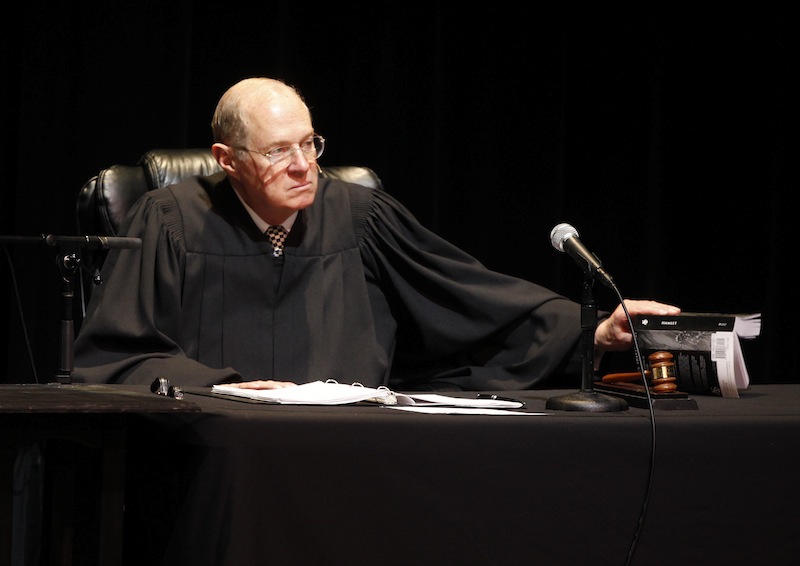If oral arguments this week were any indication, Justice Anthony Kennedy appears to hold the deciding vote in the two major same sex marriage cases. In his line of questioning, the Reagan-appointed jurist considered the possibility of a middle path that involves some important progress for the cause while falling short of enshrining marriage equality across the nation.
The justices will meet Friday to cast initial votes on the validity of California’s Proposition 8 and the federal Defense of Marriage Act. Decisions on the two separate cases are not expected until late June, leaving plenty of time for Kennedy or others to change their minds.
Although Kennedy’s record on gay rights has given advocates plenty of hope, he appeared reluctant to impose marriage equality on all states, calling that “uncharted waters.” But he was also openly skeptical that DOMA is constitutional, and modestly doubtful about the legal merits of banning gay marriage. He hinted at a federalism framework that says only states may define marriage and the federal government must accept their definition.
Notably, in both cases, Kennedy steered clear of the equal protection framework, advanced by gay rights advocates, that marriage equality bans are inherently unconstitutional.
Tom Goldstein, a well-respected Supreme Court litigator and professor, argued that the court leaned toward a path that would strike down DOMA, legalize gay marriage in California and leave the larger issue to states. This would mean dismissing the Prop. 8 case on standing (an option most justices seemed to be weighing), which would knock down the state’s gay marriage ban given lower court decisions. Meanwhile, Kennedy could use his deciding vote to invalidate DOMA on federalism grounds, steering clear of granting a constitutional right to marry.
In that scenario, the court would be allowing a modest but important step forward for gay rights, by letting same sex couples in California marry and by equalizing the federal treatment of married couples regardless of whether they are gay or straight.
If the Court decides to rule on Prop. 8, rather than dismiss it, the implications get trickier. A states rights framework could potentially validate California’s ban until voters overturn it. Lyle Denniston of the award-winning SCOTUSblog observed that “if DOMA is going to be decided as a federalism case, [Prop. 8] becomes a much harder case for the plaintiffs.”
As court watchers note, Kennedy’s intentions are often difficult to discern, and predicting Supreme Court outcomes based on oral arguments can be fraught with peril. The two hearings nevertheless indicated that the likely swing vote is searching for a compromise.
Even the conservative justices conceded this week that moral consciousness of gay equality is rapidly evolving. But oral arguments served as a reminder that despite the high hopes of advocates, it may be too much to expect of the most conservative Supreme Court in 75 years to leap ahead of states on a civil rights issue as previous, more liberal courts have done.
“Some thought that Justice Kennedy would want to carry forward the project of Romer and Lawrence and be remembered eternally as the hero of gay rights,” wrote Goldstein. “But they appear not to have fully grasped the concerns of a mainstream conservative Justice with taking so fundamental a step as finding a constitutional obligation to redefine so basic a social institution based on social science that to some appears quite new.”






